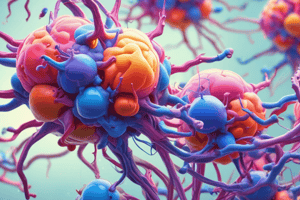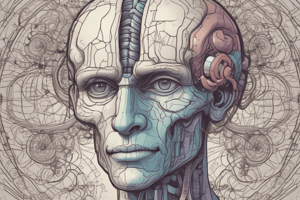Podcast
Questions and Answers
Which neurotransmitter is most closely associated with learning, memory and is directly affected by Alzheimer's disease?
Which neurotransmitter is most closely associated with learning, memory and is directly affected by Alzheimer's disease?
- Acetylcholine (correct)
- Serotonin
- Glutamate
- Dopamine
A patient exhibits symptoms including muscle paralysis, anxiety, and depression. Which neurotransmitter imbalance might be a contributing factor?
A patient exhibits symptoms including muscle paralysis, anxiety, and depression. Which neurotransmitter imbalance might be a contributing factor?
- High levels of GABA
- Low levels of Acetylcholine
- High levels of Acetylcholine (correct)
- Low levels of Serotonin
Parkinson's disease, depression and lack of motivation have been linked to which neurotransmitter imbalance?
Parkinson's disease, depression and lack of motivation have been linked to which neurotransmitter imbalance?
- Low levels of Dopamine (correct)
- High levels of Dopamine
- Low levels of Acetylcholine
- High levels of Serotonin
Which neurotransmitter is heavily involved in reward, return, and addiction, where maintaining balance is crucial to avoid anxiety and depression?
Which neurotransmitter is heavily involved in reward, return, and addiction, where maintaining balance is crucial to avoid anxiety and depression?
Increased anxiety, panic attacks, and overstimulation can result from an imbalance of which neurotransmitter?
Increased anxiety, panic attacks, and overstimulation can result from an imbalance of which neurotransmitter?
An individual experiencing lethargy, lack of motivation, and difficulty concentrating might be suffering from a deficiency in which neurotransmitter?
An individual experiencing lethargy, lack of motivation, and difficulty concentrating might be suffering from a deficiency in which neurotransmitter?
Which of the following neurotransmitters is most associated with the body's 'fight or flight' response?
Which of the following neurotransmitters is most associated with the body's 'fight or flight' response?
Which neurotransmitter helps regulates sleep, feelings of calm, and the stimulation of brain activity?
Which neurotransmitter helps regulates sleep, feelings of calm, and the stimulation of brain activity?
Schizophrenia, anxiety, and panic disorders might be linked to reduced functioning of which neurotransmitter?
Schizophrenia, anxiety, and panic disorders might be linked to reduced functioning of which neurotransmitter?
Which neurotransmitter is critical for nerve health, transmission, memory and is related to conditions such as restlessness and insomnia when imbalanced?
Which neurotransmitter is critical for nerve health, transmission, memory and is related to conditions such as restlessness and insomnia when imbalanced?
What conditions may arise from high levels of Glutamate?
What conditions may arise from high levels of Glutamate?
Which neurotransmitter imbalance is most likely associated with improved mood?
Which neurotransmitter imbalance is most likely associated with improved mood?
Which of the following neurotransmitters primarily influences mood, sleep, and libido?
Which of the following neurotransmitters primarily influences mood, sleep, and libido?
Which neurotransmitter is known for memory, nerve health and transmission?
Which neurotransmitter is known for memory, nerve health and transmission?
Which neurotransmitter does not directly contribute to at least one of the listed symptoms, anxiety, depression or panic disorders, when its levels are imbalanced?
Which neurotransmitter does not directly contribute to at least one of the listed symptoms, anxiety, depression or panic disorders, when its levels are imbalanced?
Which neurotransmitter imbalance is most likely associated with Schizophrenia and Hallucinations?
Which neurotransmitter imbalance is most likely associated with Schizophrenia and Hallucinations?
Which neurotransmitter is connected to sleep habits?
Which neurotransmitter is connected to sleep habits?
Which neurotransmitter is connected to Energy?
Which neurotransmitter is connected to Energy?
Flashcards
Acetylcholine Function
Acetylcholine Function
A neurotransmitter involved in learning, memory, attention, and muscle movements. Influences mood and pleasure.
Dopamine Function
Dopamine Function
A neurotransmitter involved in reward, motivation, motor control, libido and sleep habits. Crucial for experiencing pleasure.
Norepinephrine Function
Norepinephrine Function
Neurotransmitter affecting attention, mood, motivation, energy, and concentration.
Epinephrine Function
Epinephrine Function
Signup and view all the flashcards
GABA Function
GABA Function
Signup and view all the flashcards
Glutamate Function
Glutamate Function
Signup and view all the flashcards
Serotonin Function
Serotonin Function
Signup and view all the flashcards
Low Acetylcholine
Low Acetylcholine
Signup and view all the flashcards
High Acetylcholine
High Acetylcholine
Signup and view all the flashcards
Low Dopamine
Low Dopamine
Signup and view all the flashcards
High Dopamine
High Dopamine
Signup and view all the flashcards
Low Norepinephrine
Low Norepinephrine
Signup and view all the flashcards
High Norepinephrine Levels
High Norepinephrine Levels
Signup and view all the flashcards
Low Epinephrine
Low Epinephrine
Signup and view all the flashcards
High Epinephrine
High Epinephrine
Signup and view all the flashcards
Low GABA
Low GABA
Signup and view all the flashcards
High GABA
High GABA
Signup and view all the flashcards
Low Glutamate
Low Glutamate
Signup and view all the flashcards
High Glutamate
High Glutamate
Signup and view all the flashcards
Low Serotonin
Low Serotonin
Signup and view all the flashcards
Study Notes
- Neurotransmitters are chemical messengers within the body.
Acetylcholine
- Key functions include learning, retaining information, attention span, and muscle movements.
- Also influences mood and pleasure.
- Important to understand in relation to memory and Alzheimer's.
- Low levels linked to Alzheimer's, memory loss, and dementia.
- High levels can result in muscle paralysis, anxiety, and depression, hence balance is important.
Dopamine
- Functions include influencing mood, pleasure, libido, physical movements and sleep habits.
- Important to understand with regard to addiction, reward and return.
- Balance is crucial, any shift can lead to anxiety and depression.
- Low levels associated with Parkinson's, depression, fibromyalgia, and lack of motivation.
- High levels associated with schizophrenia, hallucinations, bipolar disorder, and manic episodes.
Norepinephrine
- Key functions include attention span, mood, motivation, energy and concentration.
- Maintaining balance is key, as any swing can induce anxiety and depression.
- Low levels can result in depression, ADHD/ADD, and postpartum depression.
- High levels can result in increased anxiety, panic attacks, and overstimulation.
Epinephrine
- Important for concentration, focus, and survival mechanisms.
- Associated with "fight or flight" response.
- Low levels can result in lethargy, lack of motivation, and lack of concentration.
- High levels can result in anxiety and panic attacks.
Gamma-aminobutyric acid (GABA)
- Functions include sleep regulation, feelings of calm, stimulation, and brain activity.
- Calmness and balance are key.
- Low levels can result in schizophrenia, anxiety, panic disorders, and PTSD.
- High levels can improve concentration, reduce anxiety, but may cause sleep disorders or hypersomnia.
Glutamate
- Important in memory, nerve health, and transmission.
- Related to excitement.
- Low levels can result in ADHD, fatigue, and poor energy.
- High levels can result in restlessness, anxiety, panic, and insomnia.
Serotonin
- Functions include mood regulation, sleep, and libido.
- Impacts mood
- Low levels result in depression, fatigue, and anxiety.
- High levels can improve mood.
Studying That Suits You
Use AI to generate personalized quizzes and flashcards to suit your learning preferences.




